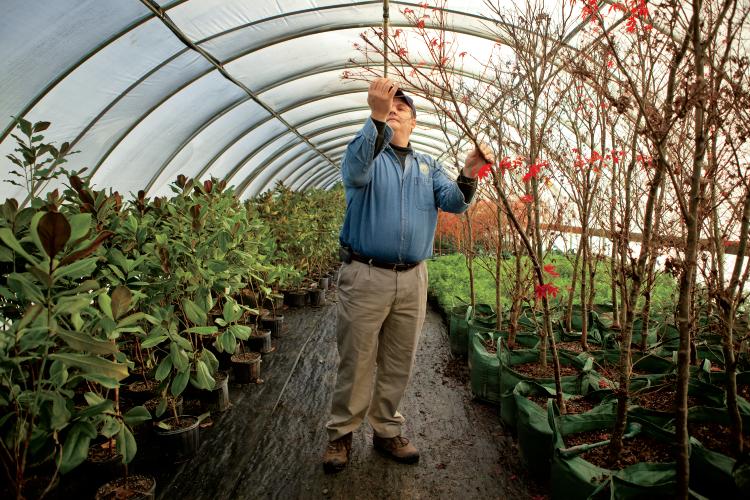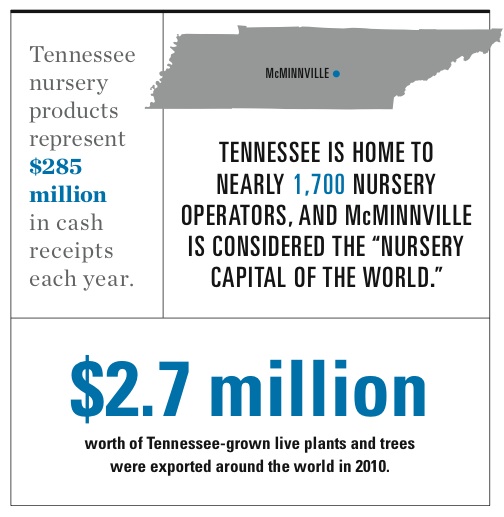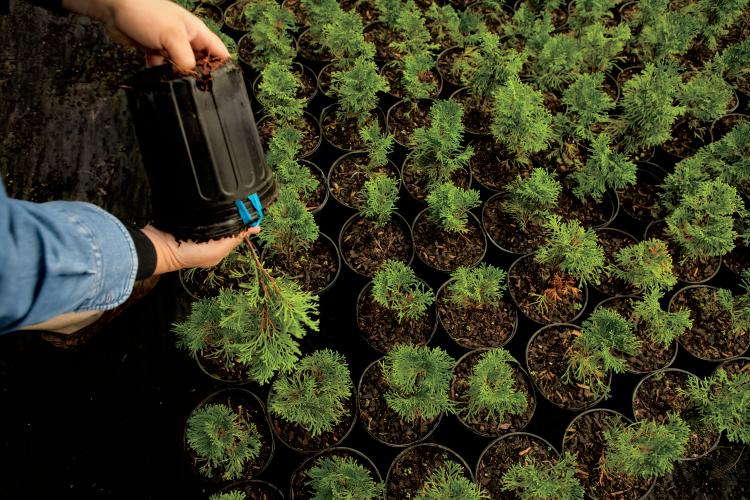Home > Tennessee > Tennessee Crops & Livestock > Horticulture and Nursery Industry Blooms in Middle Tennessee
Horticulture and Nursery Industry Blooms in Middle Tennessee
In partnership with: Tennessee Department of Agriculture

With more than 700 nurseries, 300 greenhouses, 2,500 plant dealers, and 400 landscapers certified across the state, the horticulture industry is a booming and blooming business in Tennessee. Together, those businesses translate into 21.7 million containers of plants, 48,000 acres of growing area, and $300 million in sales each year.
Add to those numbers the fact that the state is the world’s largest supplier of dogwood and peach tree liners (young plants ready for field transplanting), and it’s no wonder Middle Tennessee – specifically, McMinnville – is called the “Nursery Capital of the World.” But what is it that makes the area such fertile ground for growing so many species of perennials, annuals, ground cover, shrubs, and shade, fruit and flowering trees? According to Kyle Holmberg, international marketing specialist for the Tennessee Department of Agriculture (TDA), it’s a combination of ideal climate and soil, history and Tennessee know-how.
“We have a great reputation around the world for growing quality nursery stock,” Holmberg says. He also credits the industry’s strong partnership with Tennessee State University’s Nursery Research Center, “which supports the nurseries and promotes innovation” in variety development.
But, he says, success begins with optimum growing conditions, which Tennessee’s location ensures. With an average annual temperature of 59 degrees and 70 percent humidity, the climate offers mild winters and warm summers that are ideal for producing quality nursery stock that will thrive across the country – from areas as different in climate as Minneapolis to Austin, Texas. In addition, the silt-loam soil in Middle Tennessee is ideal for nursery stock because it retains nutrients and water and clings together to establish a strong root ball.
Factor in that Tennessee is strategically located within 1,000 miles of 46 percent of the U.S. population and has easy shipping access through a convenient network of interstates, and you have all the seeds for success.

Taking Root Outside the U.S.
Tennessee’s trees and plants aren’t just a domestic product.
Terry Gallagher, one of the owners of Heather Farms Nursery in Morrison near McMinnville, says exports account for nearly 20 percent of his business. The family-owned nursery, which was established in 1976 with 50 acres and has grown to 1,150 acres today, has long exported trees and shrubs to Canada and more recently has made inroads in the European market.
They did it by traveling to international horticulture trade shows and developing new relationships and products as a result. One product, a soft-sided container produced in Australia that Heather Farms customized to meet their standards, has opened up doors to the export market.
“The EZ container promotes a more fibrous root system while restricting circling roots, using natural sunlight and air, which means better livability for the plant,” Gallagher says. And because the containers are soft-sided, “you don’t get damage to the plants when the containers are packed tightly together.”
This commitment to innovation is earning Heather Farms an international reputation as a reliable supplier of hard-to-ship plants. “We made a significant investment of time and money to develop a soil and growing facility [for this container production] that meets the U.S. Department of Agriculture and European Union criteria and now have 10 acres of our operation dedicated to producing plants in these containers.”

Gallagher has also spent considerable time visiting Europe to see how potential customers do business and has hosted many international producers at his operation. “It’s important for them to see for themselves the differences in growing methods, how our product line can fit into their production, and the support of our nearby nursery research center,” Gallagher says. “It gives the Tennessee industry a significant competitive advantage.”
The initiative of Gallagher and other producers like him to think creatively, take risks and build relationships with international growers is the key to developing the export market, says Holmberg, who works with the Tennessee horticulture industry to promote their products.
“There are added costs to engaging in such efforts,” he says. “But there is a potential for substantial payoff in the long term for the grower, the industry and the state of Tennessee.”



